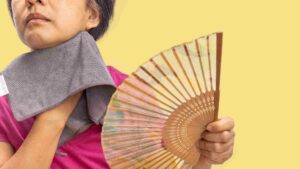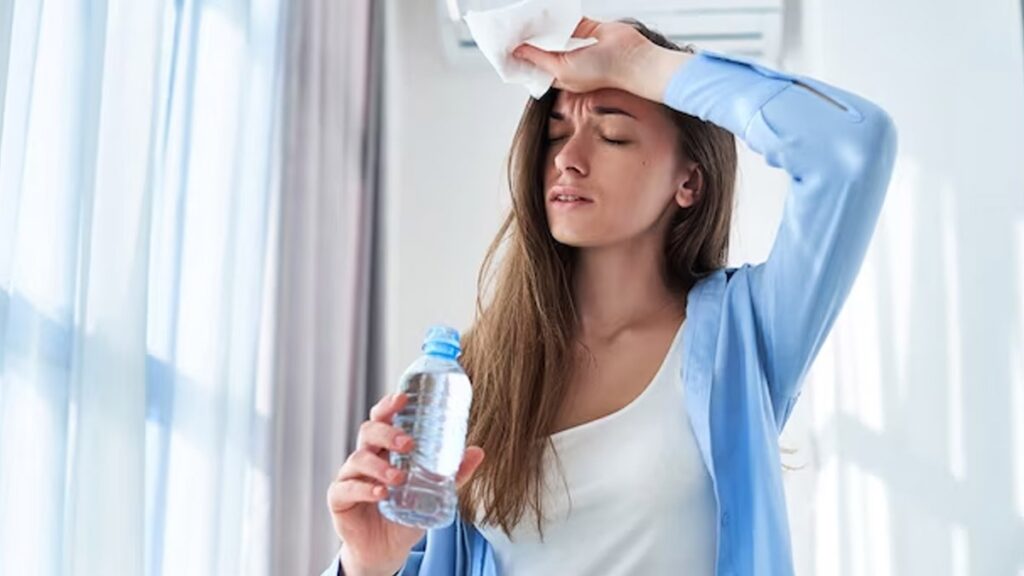Welcome to our comprehensive guide on managing and alleviating the discomfort of hot flashes. Whether you’re experiencing these sudden waves of heat due to menopause, hormonal changes, or other factors, understanding the triggers and adopting effective strategies can make a significant difference in your daily life. In this blog, we’ll explore the science behind hot flashes, and provide practical tips and hot flashes treatment options to help you stay cool and comfortable. Say goodbye to the heat, and let’s dive into the world of hot flash management.
Contents
What Causes Hot Flashes?
 Hot flashes can be triggered by a variety of factors, and while they are most commonly associated with menopause, they can affect individuals for different reasons. Here are some common triggers and causes of hot flashes:
Hot flashes can be triggered by a variety of factors, and while they are most commonly associated with menopause, they can affect individuals for different reasons. Here are some common triggers and causes of hot flashes:
- Hormonal Changes: Hot flashes are most commonly linked to hormonal fluctuations. Especially the decrease in estrogen levels that occurs during menopause. However, they can also be experienced by individuals undergoing hormonal treatments, such as those for breast cancer.
- Menopause: The most prevalent cause of hot flashes is menopause. As a woman approaches menopause, typically in her 40s or 50s, the ovaries produce less estrogen and progesterone, leading to disruptions in the body’s temperature regulation.
- Medical Conditions: Certain medical conditions and treatments can induce hot flashes. Examples include thyroid disorders, diabetes, and certain types of cancers. Additionally, treatments such as chemotherapy can trigger hot flashes.
- Medications: Some medications, particularly those affecting hormonal balance, can contribute to the occurrence of hot flashes. This includes certain antidepressants, hormone-based therapies, and medications used in the treatment of breast cancer.
- Lifestyle Factors: Habits such as smoking and excessive alcohol consumption can increase the likelihood of experiencing hot flashes. Being overweight or obese may also contribute, as adipose tissue can affect hormone levels.
- Stress and Anxiety: Emotional factors, including stress and anxiety, can act as triggers for hot flashes. Emotional stress activates the body’s “fight or flight” response, leading to changes in blood flow and temperature regulation.
Understanding these common triggers and causes is crucial for managing and finding effective relief from hot flashes. If you are experiencing persistent or severe hot flashes, it’s advisable to consult with a healthcare professional to identify the specific cause and explore appropriate treatment options.
What Are Some Hot Flashes Treatment Options?
Hot flashes treatment options aim to address the underlying hormonal imbalances or symptoms contributing to the episodes. Here are some common medical treatments for hot flashes:
Hormone Replacement Therapy (HRT)
- Estrogen Replacement: HRT is one of the most effective treatments for hot flashes associated with menopause. It involves supplementing the body with estrogen, which helps address the hormonal imbalances that contribute to hot flashes. For women with a uterus, progestin is often prescribed alongside estrogen to reduce the risk of uterine cancer.
SSRIs & SNRIs
- Antidepressant Medications: SSRIs, such as paroxetine, and SNRIs, such as venlafaxine, have demonstrated efficacy in reducing the frequency and severity of hot flashes. While their primary use is as antidepressants, these medications influence serotonin levels in the brain, which in turn may regulate the thermoregulatory center.
Gabapentin (Neurontin) and Pregabalin (Lyrica)
- Anticonvulsant Medications: Originally developed to treat seizures, gabapentin, and pregabalin have shown effectiveness in reducing hot flashes. They work by modulating nerve signals in the brain, which helps alleviate symptoms.
Clonidine (Catapres)
- Blood Pressure Medication: Clonidine, commonly used to treat high blood pressure, can also be prescribed off-label for managing hot flashes. It acts on the central nervous system to reduce the frequency and severity of episodes.
Brisdelle (Paroxetine)
- Non-Hormonal Prescription Medication: Brisdelle is a low-dose form of paroxetine, an SSRI, specifically approved for treating hot flashes in menopausal women. It provides an alternative for those who cannot or choose not to use hormonal therapies.
Vaginal Estrogen (for Postmenopausal Women)
- Local Hormone Therapy: Vaginal estrogen is primarily used to address vaginal symptoms such as dryness and discomfort, but it may also have a secondary effect on reducing hot flashes. This localized treatment helps to minimize systemic exposure to hormones.
Individuals must consult with a healthcare professional before starting any medical treatment for hot flashes. The choice of treatment depends on various factors, including the individual’s overall health, medical history, and personal preferences. Additionally, potential side effects, risks, and benefits need to be considered in the decision-making process.
As ongoing research explores new avenues for hot flashes treatment, healthcare providers can offer the latest information and tailor treatments to individual needs. Thus, it will ensure the most effective and appropriate approach for each person.
How Do You Stop Hot Flashes Naturally?
 Managing hot flashes naturally involves making lifestyle changes and incorporating practices that may help alleviate symptoms. While individual responses vary, here are some natural strategies that may help reduce the frequency and intensity of hot flashes:
Managing hot flashes naturally involves making lifestyle changes and incorporating practices that may help alleviate symptoms. While individual responses vary, here are some natural strategies that may help reduce the frequency and intensity of hot flashes:
Maintain a Healthy Diet
- Phytoestrogen-Rich Foods: Include foods like soybeans, tofu, flaxseeds, and whole grains. These foods contain compounds called phytoestrogens, which may help balance hormone levels.
- Avoid Triggers: Spicy foods, caffeine, and alcohol can act as triggers for hot flashes. Limiting or avoiding these substances may help reduce the frequency and severity of episodes.
Stay Hydrated
- Water Intake: Adequate hydration is essential for overall health and may assist in regulating body temperature. Aim for at least eight glasses of water daily and consider sipping cool water during hot flashes.
Regular Exercise
- Hormone Regulation: Engaging in regular physical activity helps regulate hormone levels and may reduce the frequency of hot flashes. Aim for at least 150 minutes of moderate-intensity exercise per week, such as brisk walking or swimming.
Cooling Techniques
- Environment: Keep your living and working spaces cool. Use fans or air conditioning, and open windows to enhance air circulation.
- Cooling Products: Gel-filled pads, cool cloths, or even a handheld fan can provide quick relief during a hot flash. Applying these to pulse points like the neck and wrists can be particularly effective.
Mind-Body Practices
- Stress Reduction: Practice relaxation techniques, including deep breathing exercises, meditation, or mindfulness. Stress management can positively impact hormone regulation and decrease the likelihood of hot flashes.
Wear Lightweight Clothing
- Layering: Dress in layers to easily adjust to changes in body temperature. Choose breathable fabrics such as cotton or linen to promote air circulation and comfort.
Maintain a Healthy Weight
- Hormone Balance: Achieving and maintaining a healthy weight is crucial for hormone balance. Excess body weight can contribute to hormonal fluctuations that may trigger hot flashes.
Stay Active Throughout the Day
- Regular Movement: Break up long periods of sitting with short breaks for movement. Regular physical activity can contribute to overall well-being and temperature regulation, even in small increments.
Acupuncture
- Traditional Chinese Medicine: Acupuncture, a component of traditional Chinese medicine, involves the insertion of thin needles into specific points of the body. Some individuals report relief from hot flashes after undergoing acupuncture sessions.
Herbal Supplements

- Consultation with a Healthcare Professional: Before incorporating herbal supplements like black cohosh or evening primrose oil, it’s essential to consult with a healthcare professional. Some herbs may interact with medications or have potential side effects.
Remember that individual responses to these strategies can vary. Hence, what works for one person may not be as effective for another. If hot flashes persist or significantly impact your daily life, seeking guidance from a healthcare professional is crucial for personalized advice and potential medical interventions.
Conclusion
In conclusion, understanding and managing hot flashes involve a multifaceted approach that considers both natural strategies and medical interventions. By making simple lifestyle adjustments, individuals may find relief from the discomfort of hot flashes. Additionally, cooling techniques, mindfulness practices, and wearing lightweight clothing can contribute to a more comfortable daily experience. For those seeking medical solutions, hormone replacement therapy (HRT), antidepressant medications, and other prescribed treatments can address the underlying hormonal imbalances.
It’s essential to consult with a healthcare professional to explore personalized options and make informed decisions based on individual needs and health considerations. With a combination of natural strategies and medical guidance, individuals can navigate the challenges of hot flashes and work towards improved well-being.
If you are facing menopause related issues, menopause treatment at HerMantra can help. Book your free trial online menopause treatment session now.


